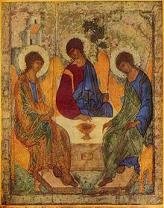 Byzantine spirituality is intensely communal. It is deeply rooted in Byzantine thought that an individual is not saved as an individual but as a member of the Body of Christ, the Church. Incorporation into the Church brings not only salvation but also the responsibilities of membership.
Byzantine spirituality is intensely communal. It is deeply rooted in Byzantine thought that an individual is not saved as an individual but as a member of the Body of Christ, the Church. Incorporation into the Church brings not only salvation but also the responsibilities of membership.
Communal life with Christ is extended and expressed first and foremost in the Holy Mysteries (sacraments) by which Christ gathers his community around himself and imparts life. Thus, membership in the Church is an existential need, like air to breathe and water to drink. The union-with others (communion) is absolutely essential for us to achieve the meaning and purpose of our lives.
Related to the communal nature of Byzantine spirituality is its emphasis on the communion of saints. The cult of the saints truly enjoys greater prominence and expression in our Byzantine spirituality than in Western spirituality. The role of Mary, Mother of God, the one around whom the Church gathered for the first Pentecost, is decidedly much more prominent in the spirituality of the Byzantine Church. It should be noted that in Byzantine Spirituality Mary is only referred to as the Mother of God. That is her greatest honor. In iconography she is never drawn alone. She is always drawn with Jesus.
It is said that Slav Byzantine piety is founded on two pillars: the psalter and the lives of the saints. Every liturgical service we have, even the Divine Liturgy, contains parts of the Psalms (e.g., Prokimenon and Alleluia verses). The use of the Psalms for worship connects us very closely to our Jewish heritage. They are the hymns of the Chosen People of God, which now also includes us who follow Jesus.
For the Byzantines the Church is a long line of people from the first human being to the last one, all following the New Man, Jesus Christ. Those coming after us in the future are no less a part of our life and Church than those of us here present.
It is a general rule of thumb in our Slav-Byzantine spirituality, that we come to truly gain a deeper insight into our faith through our worship. Worship is the primary teacher of faith. Being attentive, for example, to the prayers and actions of the Divine Liturgy, can bring us to a deeper understanding and appreciation of what we believe.
